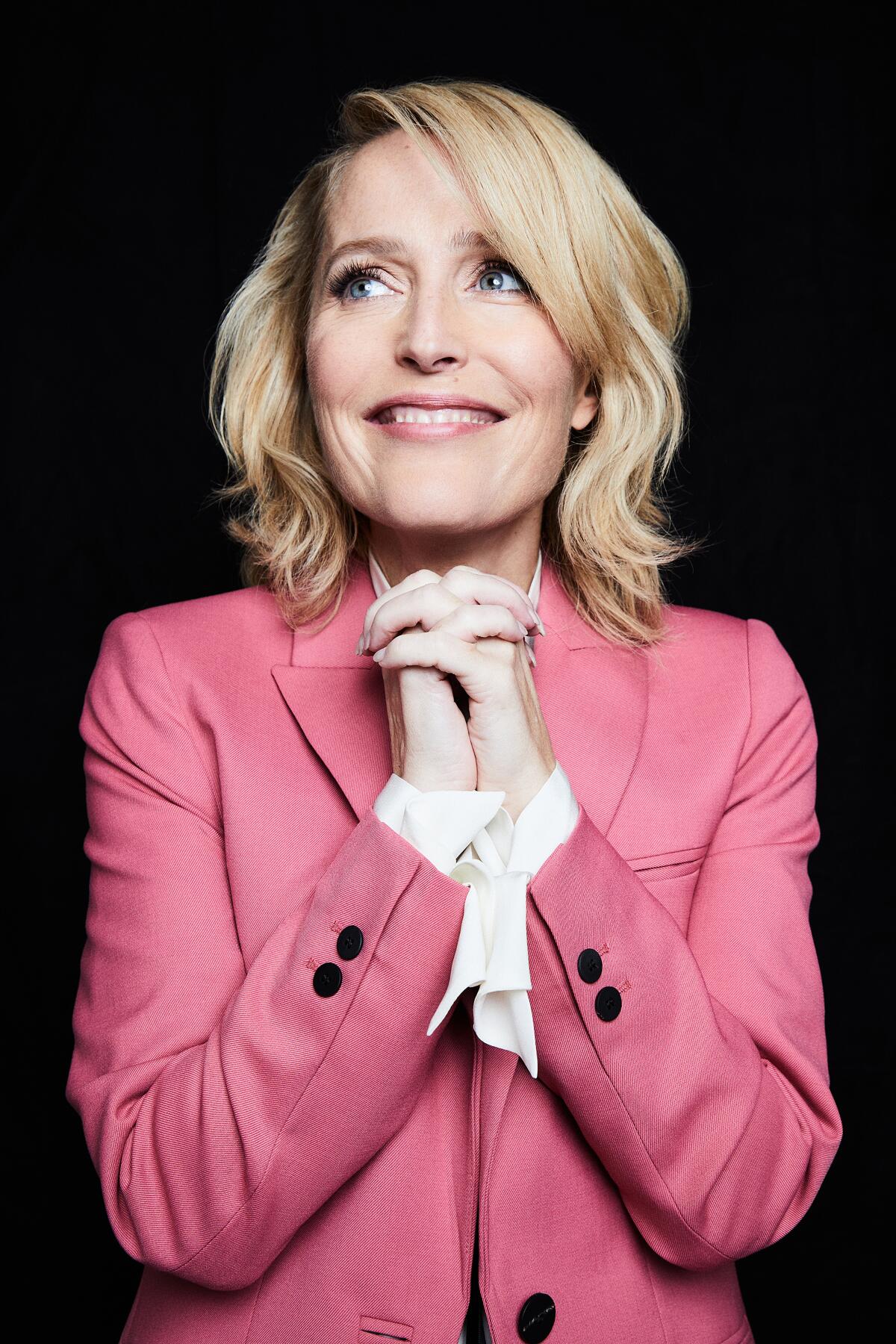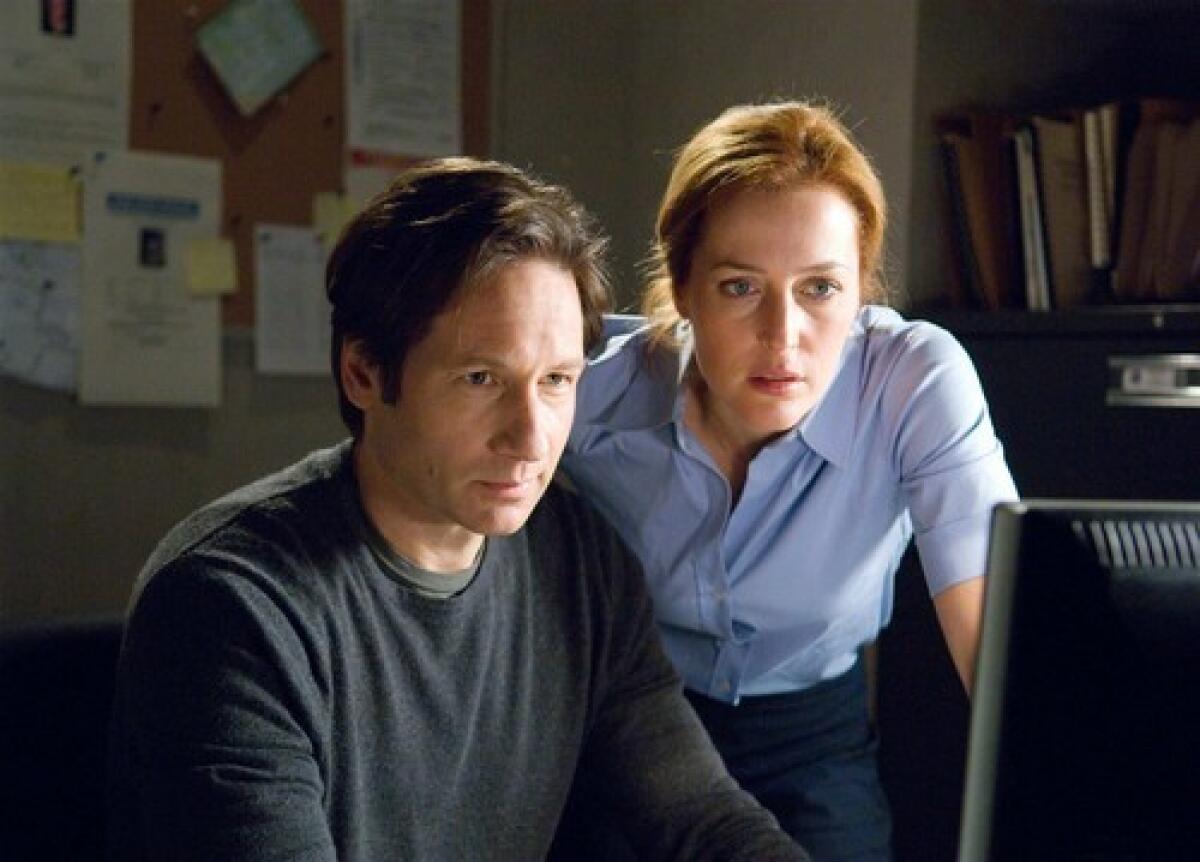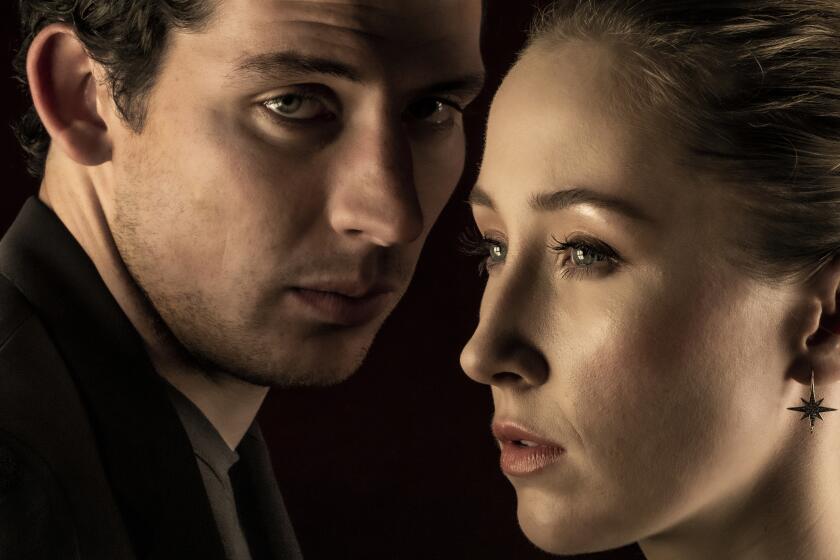‘The Crown’s’ Gillian Anderson humanizes Margaret Thatcher. Some might not like it

- Share via
Gillian Anderson acknowledges she may have over-prepared for her latest role — as former British Prime Minister Margaret Thatcher in the new season of “The Crown” — before her hands actually touched a script. But she’ll tell you the exhaustive research was invaluable for getting into the psyche of Britain’s steely first female prime minister, who came to be known as the “Iron Lady.”
“I researched as if I were doing the Margaret Thatcher biopic,” she says by phone on a recent Sunday. “And then, from getting the script, I found myself going: ‘Oh, right, I am in six [episodes], not 10. This isn’t about me.’ Obviously, I’m being silly. But the nature of ‘The Crown’ — it’s through the lens of the crown.”
“That’s where the research helped,” she continued. “Understanding, potentially, why she is making kedgeree for the Cabinet ministers up in the flat above. And how important that is to her as a woman, as anything else is important to her.”
Available to stream on Netflix beginning Nov. 15, the new season of “The Crown,” created by Anderson’s partner and longtime royal chronicler Peter Morgan (“The Queen”), delves into the sometimes tense relationship between Queen Elizabeth and Thatcher, who served from 1979 through 1990. It also explores the early period in the union of Prince Charles and Diana, Princess of Wales.
Anderson has been keeping busy on the small screen. She can also be seen in Netflix’s British teen dramedy, “Sex Education,” which is currently in production on its third season. The conversation has been edited for clarity and condensed.
For three seasons, Netflix’s “The Crown” has inspired viewers to research the royal family and British history. Wikipedia and Google data bear that out.

You recently began shooting the new season of “Sex Education,” right? With the various safety protocols in place, does it feel all that different to be back on set?
Yes, I’m actually in Wales as we speak. The rest of Wales is in total lockdown. We get tested a couple times a week and there’s very serious protocols. Knock wood; so far, nobody’s tested positive and they’ve been shooting since the beginning of September. I feel very lucky to be able to work. And that I actually get tested on a regular basis, because it’s actually quite hard to get tested in the U.K., as I understand it. I am not complaining.
I feel for the crew who is wearing these masks all day long. We get to take them off during a scene, obviously, whereas the boom operators who are holding a huge pole over their head for 15-minute scenes or whatever before they break — we are not the ones who are struggling. It’s different, but it’s not as different as I would have imagined or maybe I feared that it would be. Had you been searching for a way to be on “The Crown,” or had Peter been searching for a role that would make you consider it?
When I first heard about “The Crown,” I was in New York doing [“A Streetcar Named Desire”] and the girl who played my sister, Stella, was Vanessa Kirby, who played Margaret [in Seasons 1 and 2]. And she was talking to me about this thing that she had shot between when we did the play in London and when we did it in New York. I had no idea, anything about it. And the thought of it didn’t really appeal to me. I didn’t think: “Oh, let me look into that, it sounds like something I want to do.”
Not that long after was when Peter and I got together, so I was exposed to it on a very intimate level and watching how it was produced and going to visit set and seeing how the feel of the set was very different than I had experienced on the majority of things that I’ve ever worked on — it really felt very adult, very well run. Not that other things I’ve done haven’t been, but it just felt there were a lot of grown-up people in charge and it had a really loving feel to it. But I never investigated, I never searched out ... and so when it came up as an idea, and Pete asked if I thought that I could potentially do Thatcher, and I thought about it seriously, there were two sides for that. One was, would I want to work on “The Crown,” period? By that point, it was a no-brainer, having seen how beautifully the series was shot and written. And then the other was, did I think she could live somewhere inside me; did I get how to interpret her? Both of those were resounding yeses. You were born in the U.S. but grew up in the U.K. What do you remember about the Thatcher era?
I grew up in the U.K., but we left in ’79. So we left the year she was coming in. I have no memory whatsoever of being aware of much political anything. I don’t remember dinner conversations about it, I don’t remember anything. Once moving to the States, so much of my world — even though, again, I would have been hearing about Reagan and Carter — I’m not even sure whether she came into my radar at all until, perhaps, I was in high school. I really came at this, certainly, with preconceptions of other people’s opinions and beliefs and strong feelings about her, but nothing from my own experience.
In Season 3, Netflix’s “The Crown” turns the focus to Prince Charles and Princess Anne, played by Josh O’Connor and Erin Doherty.
She was such a polarizing political figure. How was it trying to find a compassionate journey in this role?
Ultimately, the Thatcher that I’m playing is the Thatcher as per Peter Morgan scripts in “The Crown.” There’s a lot of humanity in his scripts, period. No matter who the character is. And that’s no different for Thatcher. And so you get to see more than we’re used to seeing of her as a wife, as a mother. You see as much of those aspects of her as you do of her as a politician.
Between playing those scenes and understanding from the research that I did, just the challenges that she had specific to class, specific to the fact that she was a woman, and by the nature of the role that she was stepping into ... completely surrounded by men. And she perpetuated that because she enjoyed the company of men and there was only one woman that she hired in the Cabinet in the 10, 11 years that she was in office. She perpetuated that. But at the same time, as you see in the series, it was a different kind of support that she surrounded herself with when she re-cast the Cabinet and continued to reshuffle as she went on. Some of that is about coming up against disagreement time and time and time again or people who patronize her, or felt that she was never going to be as effective as a male leader. And some, by the end of it certainly, was because they just weren’t doing what she wanted them to be doing.
I think that you get a good sense of all aspects of her in the series, seeing a much more three-dimensional characterization of Thatcher than one might in a political documentary or one might have thought about her historically. I think that, if it’s not compassion — because there’s a lot of people who, regardless, will never find compassion for her — at least there’s a sense of a human being there that was more than just the rhetoric and the policy.I assume you studied a lot of videos. Did you pick up on any of her tics or mannerisms beyond her voice that helped you sink into the role?
You can’t really see her in image and moving form without noticing the tilt of her head or the slightly buck teeth or how she holds her hand and the fact that she has a condition where her two outside fingers curl inward a little bit. You can see that when she’s gesticulating — those kind of things that you can pick up from video. And then there’s her walk, which is only her walk. She’s barreling ahead of every other world leader or whatever it is. So picking up on some of it but at the same time trying to not to make too much of it so that it’s not a mime. That was something that Peter said really early on ... he didn’t want me to disappear so much that we didn’t see Gillian in there.
What was the process of putting a voice like hers together, to capture the nuance of her vocal pattern? Thatcher worked with a vocal coach.
She was born in the north, she was born in Lincolnshire, so she would have had a much different voice when she was a child. She received elocution lessons when she was in school. And so she’d already made steps in that direction. And then when her PR person came in, who kind of took her under his wing, he suggested she start to work on her voice. That was still while she was in opposition. You can see the change that happens if you listen to the old footage.
You don’t get to really see, in this decade of “The Crown,” her at the podium or a party conference where you get the full weight of her oration and what happens to her voice in those situations. Just for the sake of the continuity of the show over the decade, it was important to find a voice that was a little bit grounded in my own sense so that it didn’t sound too forced. Before I started working with a voice coach, I had her in my ears and speakers and stuff, just to try and get a sense of her rhythms and the breaths that she took. It’s a very breathy voice and so, therefore, I have to start quite far down in the diaphragm.You said that you didn’t watch other notable portrayals of Thatcher, including Meryl Streep’s, while preparing for the role but that you might rewatch when you were done. Have you gotten around to that?
No. I think I’m going to wait until it comes out. I’m too close. The jury is still out. But I’d like to. I think it would be fun. And also to go, like, “Oh, that’s interesting.”
Thatcher is very measured and focused on making her points. Jean on “Sex Education” is much more alive and unafraid to raise her voice when needed. Was it nice to go back to that?
Last week was my first week back, and I feel like it’s been so long since I’ve acted; it’s been so long since I’ve been around other people. I feel like last week was as much about me reminding myself that I am an actor, that I’m not entirely sure that I’ve leapt into all the fabulous aspects of getting to play Jean. I feel like, OK, I’ve done my first week. Now I can kind of relax and dig into it. I am looking forward to that moment because she can be an absolute joy to play.
Your first big role was as Dana Scully in “The X-Files.” Did the role of Scully ever become too big for you? Did the fandom ever feel overwhelming?
I certainly felt like it was a lot when I was taking my 2-year-old to the park and there were paparazzi on every corner and I was, like, 27 or whatever. Any time I go to a Comic-Con, you feel like, “Oh, my god, this is a lot,” but, of course, you’re asking for it. That’s why you’re there. In general, it’s just appreciation, right? That’s just good. We should all get appreciated as much as Scully got appreciated.
Early on in the London stage production of “All About Eve,” Gillian Anderson’s Margo Channing removes her stage makeup in a bright dressing room mirror.

I read an interview you gave early on in the run of “The X-Files” and you talked about how unsure you were of your work. When you saw directors and producers huddled together, you thought it was because they were trying to fire you.
I still think that. Every job, I swear to God. If producers are huddling at the monitor, I think they’re discussing the fact that they need to fire me. I hate first days, and sometimes first weeks. Seriously. First couple of days, I’m not fun. I’m closed. I’m probably just in fear — I’m thinking: Do I know what the f— I’m doing? All that’s going on. That’s partly why I’m excited for the second week [of “Sex Education”], because I feel like by that week, I can relax.
You’re also no stranger to the stage. As you mentioned earlier, you played Blanche DuBois in a production of “A Streetcar Named Desire” a few years ago. And it was a production preserved on film and streamed on YouTube as theaters everywhere remained closed because of the pandemic. How are you feeling about the state of theater right now?
It’s so hard to know how things are going to be. I was just having a conversation with someone today who saw an amazing Zoom production of a play, and someone else is putting a Zoom production of something else together. I’m in the process of working with somebody who’s just starting to write something for the future. People are trying to find their way and trying to get an idea of what things are going to look like eventually. I have to imagine that when the vaccine is out there that we will all be desperate to be sitting in theaters. I know people who have sat in theaters, socially distanced, and felt OK. Maybe when we’re all vaccinated we’ll be able to actually sit next to each other and watch. I don’t know whether the theater is ever going to recover in the same way that it was before. And certainly, maybe, the input that government has on theater production and subsidies needs to be looked at a bit closer than perhaps it’s been looked at in these countries in the past, because it is a necessity for many people, not just people who are in the industry and really, really, really struggling at the minute, but people who value culture and artistic live experience and the impact that that can have on and does have on their lives, whether it’s fringe theater or whether it’s Broadway. I think it’s going to take a mountain of support to be able to get things back close to where they were.
More to Read
The complete guide to home viewing
Get Screen Gab for everything about the TV shows and streaming movies everyone’s talking about.
You may occasionally receive promotional content from the Los Angeles Times.








